It’s never a bad time for adventure fantasy, but I would posit that now is the best time for adventure fantasy.
Here are some of my favourites, hand-selected for escapism, intrigue, high density of swordfights, and sheer enjoyment. Ideal if you have a fire handy to curl up beside. (Surely I am not the only one with a persistent daydream of sitting in a huge wingback armchair before a crackling hearth?)
The Winnowing Flame Trilogy by Jen Williams
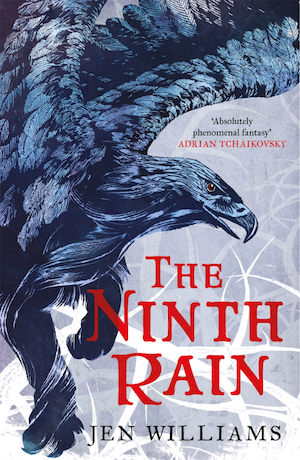
I read this trilogy—beginning with The Ninth Rain—back to back, start to finish, something I don’t think I’ve done with a series for years. These books are just terrifically good fun. They reminded me, in the best way, of curling up in the school library and discovering the great fantasy standards for the first time. They have everything I loved as a teenager—mythical beasts, heroic last stands, unfathomable foes—with a fresh modern twist and a pervading sense of humour. But, most importantly, they have sad vampire elves. “Get this—they were immortal—but then their tree-god was killed—so they had to drink human blood to survive!!!”—me, to all my friends, for the past two months. If that doesn’t convince you I don’t know what to tell you. [Editor’s Note: these books are currently only available in the UK from Headline Books.]
The Green Bone Saga by Fonda Lee
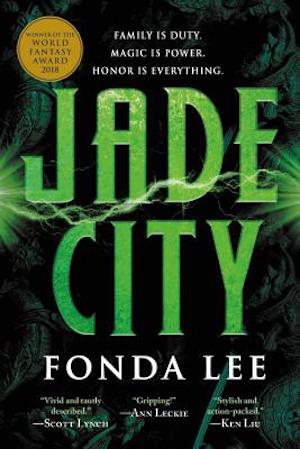
Part family saga, part crime drama, part martial arts epic, Fonda Lee’s Green Bone Saga is one of my absolute favourite fantasy series of the past few years. The worldbuilding is intricate but never overwhelming, and Lee deals subtly with themes you rarely see in fantasy: globalisation, diaspora cultures, the transformation of a traditional way of life. If that sounds kind of heavy, do not be deceived: the primary joy in this series is (1) nail-biting duels, (2) the sheer range of awful things that can happen to the Kaul siblings, (3) the fantasy of driving around the city, surveying your territory through the smoked-glass windows of a gorgeous automobile. Jade Legacy, the final book in the trilogy, is out next year and I cannot wait.
Kalpa Imperial by Angelica Gorodischer
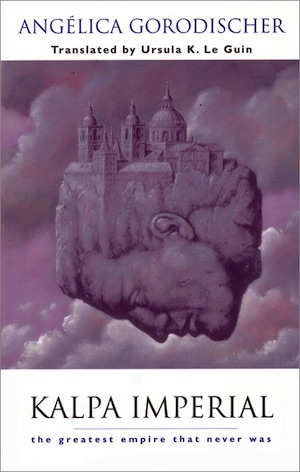
Something between a novel and a short story collection, Kalpa Imperial explores the history of a vast imagined empire through a series of loosely connected vignettes. The stories are—by turns, and sometimes all at once—funny, brutal, cynical, optimistic, bizarre and delightful. You get the sense of exploring an immense half-forgotten ruin. One to read and re-read.
The Name of the Rose by Umberto Eco
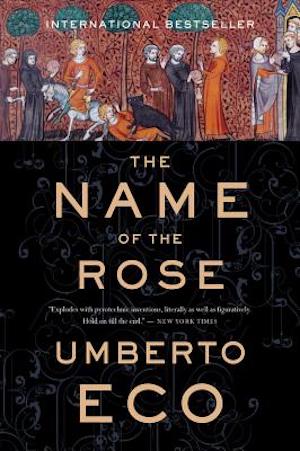
“But this is a work of literary historical fiction,” I hear you cry. I mean, yes, but it also has murders at a remote abbey in the snow, a haunted non-Euclidean library, and one bit where the adorably hapless narrator describes a lavish altarpiece for three or four pages. Speaking of the narrator, Adso of Melk is the sweetest and most useless monk of all time, although I suppose it’s not his fault that he spends all his time with Monk Sherlock Holmes. Great stuff. If you want to learn a great deal about fourteenth-century heresies, you can keep Wikipedia open in a tab, but it’s definitely not mandatory.
The Henchmen of Zenda by KJ Charles
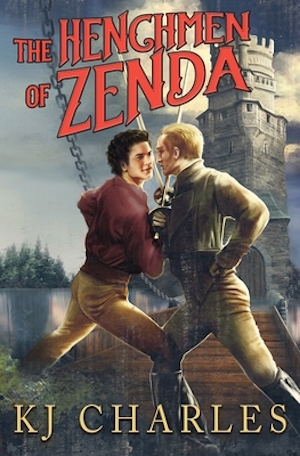
The legendary Victorian pulp The Prisoner of Zenda is an account of a British traveller who must pose as the King of Ruritania in order to foil a dastardly plot. The Henchmen of Zenda reimagines the story from the villains’ perspective—always one of my favourite conceits. The winningly salty Jasper Detchard’s take on the evil scheme includes intrigues within intrigues, kidnap, blackmail, murder, and his offbeat romance with the dashing Rupert von Hentzau. Pure delight.
Dungeon Meshi by Ryoko Kui (aka “Delicious in Dungeon”)
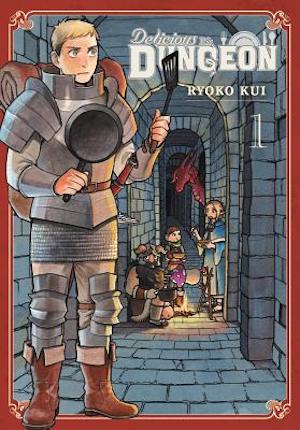
This manga starts with a great premise for jokes. What if an adventuring party had to resort to cooking and eating the monsters in the dungeon they’re exploring? Cue lots of scenes where they have to figure out how to cook mandrake, kraken, etc. It very soon becomes a lovely exploration of fantastic biology (did you know living armour is a mollusc?) which doesn’t shy away from the creeping horror implications of the scenario. The art is absolutely gorgeous, the characters are perfectly endearing, and the worldbuilding is complex, quirky and surprising. Health warning: you may end up hungry for things which do not exist in nature.
The Three Musketeers by Alexandre Dumas
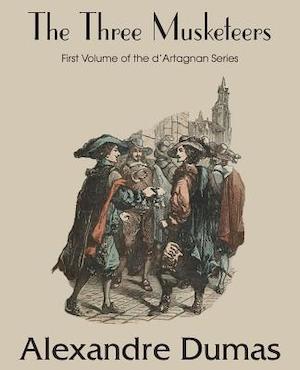
There is a possibly apocryphal story that, on his deathbed, Dumas reread The Three Musketeers to see whether it was still good. It was, and still is. While not technically a work of fantasy, I’ve included it here because it’s one of the finest adventure novels of all time. It has swordfights, espionage, significant jewellery, wonderfully devious villains, and all manner of hijinks. If you’ve been put off by one of the (many) lacklustre film adaptations, do give the book a try—it’s wittier, livelier, cleverer and more charming than any of its imitators.
Originally published in May 2020
A.K. LARKWOOD studied English at St John’s College, Cambridge, and now lives in Oxford with her wife and a cat. The Unspoken Name is her debut novel.










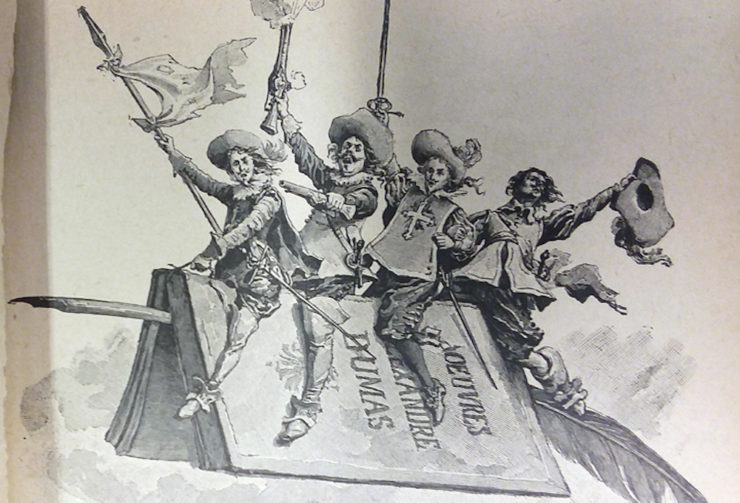
Amen on The Three Musketeers. D’Artagnon’s introduction to Paris and his future friends is side splittingly funny and best summarized in this exchange:
Athos, pointing at D’Artagnon,: This is the man I am going to fight.
Porthos: This is the man I am to fight!
D’Artagnon: But not untill 2:00.
Aramis: This is the man I am going to fight!
D’Artagnon: But not untill 3:00.
The Deer Hunter by James Fennimore Cooper
I am just going to say that if you have never seen Richard Lester’s 1973 film version of The Three Musketeers (and its second half, The Four Musketeers), with Michael York, Oliver Reed, Richard Chamberlain, Frank Finlay, Raquel Welch, Charlton Heston, Christopher Lee, Roy Kinnear, Faye Dunaway — ye gods, I could go on — then you absolutely must. It is the definitive cinematic version; nothing else comes close. It captures the adventure, the spirit, the humour, the utter brilliance of Dumas’s story perfectly (the exchange between D’Artagnon and the other Musketeers quoted above is delivered precisely as it should be). The swordplay is — and this is attested to by those who actually study this sort of thing — some of the most authentic ever put to film.
Read the unabridged original. And see the film. These are musts for anyone who loves adventure and romance.
Agreed to the many lackluster film adaptations of The Three Musketeers with the exception of the 1973 version directed by Richard Lester with Michael York as D’Artagnan and a star studded cast as everybody else (Richard Chamberlain brilliantly cast as Aramis, Charlton Heston as Richelieu, Faye Dunaway as Milady opposite Raquel Welch as a kutzy Constance.) Hilariously exciting. It’s available on at least one streaming platform as well as on DVD.
Just wanted to add to The Three Musketeers love. Both the novel and the 1973 film. And if you like that, you should try Dumas’ The Man in the Iron Mask. Also a very good read.
And if you decide afterward you want a classic revenge novel, take a gander at The Count of Monte Cristo.
Still the best, IMO.
For escapist fantasy, tho, I like the Master Li & Number Ten Ox books.
@2 but see: https://twain.lib.virginia.edu/projects/rissetto/offense.html
I will add another vote for excellent 1973 film version of “The Three Musketeers”. I will also point out that the writer for that movie was none other than the illustrious George MacDonald Fraser, author of the Flashman novels.
I will also point out that Fraser took the plot of “The Prisoner of Zenda” and used it for his second Flashman novel “Royal Flash”. Flashman is blackmailed by Otto von Bismarck into impersonating a Danish prince. Flashman says that it was his drunken recounting of this episode in his much checkered career that inspired “The Prisoner of Zenda”.
A minor quibble: The Prisoner of Zenda was not a pulp novel, but a standard novel that started the whole sub-genre of Ruritanian romances, alive to this day.
One of the joyful moments of my life was wandering through the empty of people back stacks of the Syracuse University library and coming across The Three Musketeers shelved besides, “What’s this? There are more of them?! How did nobody tell me this?!” I promptly swept all of them off the shelf and read them one after the other over the ensuing days (might explain my test scores) and have reread them several times since. I have the exact same editions now sitting visible on my shelves from where I sit and every time I see them side by side I think of that moment in the library. And I second the comments in then 70s film versions
While I will agree with the nigh-universal acclaim for the ’70s films, I also have a soft spot for the 1993 Disney version, which has some lovely character bits, particularly by Tim Curry as Richelieu.
I think Poul Anderson’s The High Crusade is a fine book that fits this category. Probably several others by him as well.
@6
yes, indeed. I was careful to get the Oxford classics edition of Monte Christopher, and it has everything that was cut from bowdlerized editions.
The Bridge of Birds still makes me cry.
@7
Twain’s attack on Cooper is marvelously funny – and accurate.
one of my other favorites is The Armor of Light, when both Philip Sidney and Christopher Marlow cheat death to save James VI from sorcery and England/Scotland from the civil war. Just as it should do, theatre (including Shakespeare) saves the world.
I would add (among too many others, of course) Steven Brust’s scrumptious Dragaeran books, which include a loving reimagining of Dumas’ Three Musketeers series.
Oh, and Elizabeth Bear’s Promethean Age series! Kit Marlowe, Shakespeare, Faerie, the whole Matter of Britain, and the shipyards of NYC. A LOT of fun, and slyly erudite fun to boot! (Though the ending of Hell and Earth had me in tears.)
It’s stretching the boundaries in any number of ways, but I have to pop in here to recommend the 1997 French film On Guard (Le Bossu), which is a magnificent adventure, my favorite swashbuckler, and based on a book by Paul Feval, who was one of Dumas’ contemporaries.
On Guard (1997) – IMDb